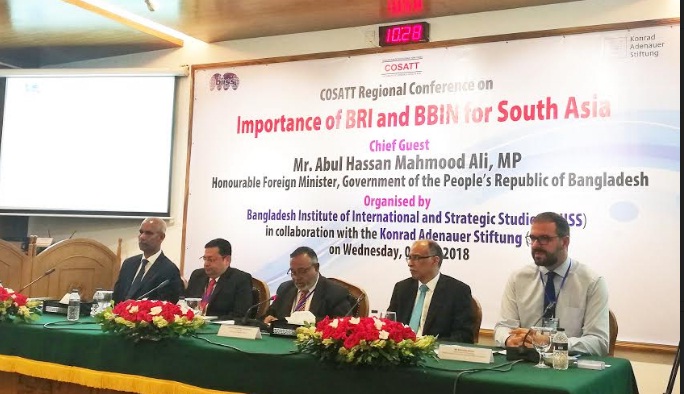Speakers for greater connectivity among SA countries

Speakers at a programme on Wednesday stressed the importance of increased connectivity among the South Asian counties through implementing Belt and Road Initiative (BRI) and the Bangladesh, Bhutan, India, Nepal (BBIN) Initiative for the benefit of the smaller countries and to utilize their potentials.
The inaugural programme of COSATT Regional Conference on “Importance of BRI and BBIN for South Asia” was organised by Bangladesh Institute of International and Strategic Studies (BIISS) in collaboration with Konrad Adenauer Stiftung (KAS).
Speaking as the chief guest, on behalf of Foreign Minister AH Mahmood Ali, Kamrul Ahsan, Secretary (bilateral and consular) at the Ministry of Foreign Affairs said Bangladesh is aware of its location bridge in between South and South East Asia and its potential within the connectivity architecture of this region.
Mentioning that regional connectivity has much importance for Bangladesh, he said in the changing world, which is brought closer through various modes of connectivity, Bangladesh also seeks to connect with the region and the rest of the world through transportation network and other connectivity initiatives.
Comprehensive connectivity will generate trust and confidence in the relation among countries of the region, he added.
While claiming that there has been visible improvement of bilateral connectivity between Bangladesh and India in the recent time, Kamrul Ahsan said, this connectivity can be utilised by other countries beyond India such as Bhutan and Nepal.
Bangladesh is actively participating in many bilateral regional and sub-regional connectivity actiivites like BRI and BBN, he said.
BIISS Director General Major General AKM Abdur Rahman in his welcome speech said without achieving genuine and sincere connectivity among the countries of South Asian region, the countries will never be able to proceed as it is expected and as the potentials they have.
Dr Nishchal N Pandey, Director of Centre for South Asian Studies in Nepal, said the borders of the region got closed due to many reasons while Europe and other regions have started opening up theirs.
“BRI and BBIN are grand doer’s projects of great significance in South Asia. Both of them promised a great deal in terms infrastructural development and connectivity, trade, transit, tourism and energy cooperation between the countries”, he said adding that, “There are challenges but the promises these two project holds are of greater value.”
Urging the countries of the region to come closer and build greater cooperation, Dr Nishchal said, smaller countries of the regional like Nepal, Bhutan, Bangladesh, Sri Lanka can be directly benefitted by the connectivity projects.
Becoming one of the fastest growing regions of the world, countries of South Asia need to broad its state of connectivity and need to work together to reduce connectivity gap, he said.
The Inaugural session of the two-day conference was chaired by Munshi Faiz Ahmad, BIISS chairman.
Consortium of South Asian Think-Tanks (COSATT), a network of some of the prominent think-tanks in South Asia, arranged the conference where different topics including trade connectivity, transport connectivity, functioning BRI and BBIN are to be discussed by the participants.
